Never “Call Your Ex” When Hiring a Pharmacist
 I was interviewing a candidate last month and fell in love with this person. I could see myself really enjoying working with her and thought she would be outstanding for the role she was interviewing for. I was imagining how she would fit in with our company, how we could really use her savvy marketing skills that I could tell were very authentic. She had a natural ability to make you want to listen to her even when you hadn’t talked to her for very long. What a great possibility for a potential recruiter, I thought.
I was interviewing a candidate last month and fell in love with this person. I could see myself really enjoying working with her and thought she would be outstanding for the role she was interviewing for. I was imagining how she would fit in with our company, how we could really use her savvy marketing skills that I could tell were very authentic. She had a natural ability to make you want to listen to her even when you hadn’t talked to her for very long. What a great possibility for a potential recruiter, I thought.
But something didn’t feel right. Although she was enthusiastic about marketing, she didn’t seem that enthusiastic about our company. One example was that she didn’t grasp what our company did from our website. In fact, she was totally off. She didn’t put the two and two together that we help connect pharmacists with jobs. Red flag, red flag! I started to justify it in my head that maybe our website’s unclear. But I couldn’t bring myself to settle in that justification because every interviewee who’s looked at our website has understood what we do.
Yet I was tempted to call her back.
And when I still hadn’t found the right person a few weeks after that, I thought again about calling her back.
Have you experienced something similar when you’ve been in the process of hiring a pharmacist? It’s like wanting to call your ex—you have moments when you think maybe you were wrong about breaking up with someone. Time goes by and you wonder…maybe it wasn’t really that bad after all? It’s the same when you’re in that position where you really need to hire someone, but haven’t found the right person yet. When the workload gets backed up in the pharmacy, you may be tempted to call this person you liked & question whether your judgment was right the first time. You get tempted…
 My honest assessment of her was that she would have been fantastic in the role I was looking for. But I didn’t think she had a true interest in the recruiting profession. My intuition was that if she were to work with us, this would just be a temporary in-between career move for her. And that wasn’t necessarily in alignment with our company’s needs.
My honest assessment of her was that she would have been fantastic in the role I was looking for. But I didn’t think she had a true interest in the recruiting profession. My intuition was that if she were to work with us, this would just be a temporary in-between career move for her. And that wasn’t necessarily in alignment with our company’s needs.
It took a bold move to not move forward with considering her, rather than to open our company to misalignment. To tell you the truth, I called her back and looked for how she may explain why she didn’t grasp the first time what our company. But the conversation confirmed my initial intuition. What bold stance will you choose to save you trouble from hiring down the road?
Put the phone down, and keep looking for the right candidate. If you still aren’t getting the right candidates, maybe it’s a good time to develop a relationship with a highly-experienced recruiter who understands your specific needs and can attract and pre-screen candidates for you, so you can spend more time doing what else is important on your plate. If you “call your ex,” you’ll regret it–and you’ll only waste your time and theirs in the long run.
Next time you are tempted, just remember—do you really want to be calling your ex?
IHS Pharmacy Directors: Pharmacy staff to decrease with CMOP implementation?
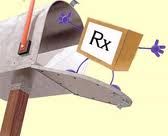 I promised you an update on concerns about IHS pharmacies starting to offer central fill mail-order prescription refills through the Veteran’s Affairs Consolidated Mail Outpatient Pharmacy (CMOP) in Leavenworth, KS.
I promised you an update on concerns about IHS pharmacies starting to offer central fill mail-order prescription refills through the Veteran’s Affairs Consolidated Mail Outpatient Pharmacy (CMOP) in Leavenworth, KS.
Some concerns I heard from IHS/tribal pharmacy directors were: How would mailing prescriptions impact the current pharmacy staff? Will mailing prescriptions really be in the interest of patient care, and will every site be required to provide mail service? What about tribal pharmacies-can they get involved? Click here to find out the answers
I spoke to CAPT Pam Schweitzer, IHS-VA National CMOP Coordinator, to ask her these and other common questions about IHS mailing prescriptions and using the VA CMOP.
Read on to find out answers to some FAQs about the program and how the goals above will be met:
 Q: Is pharmacy staff expected to increase, decrease, or stay the same?
Q: Is pharmacy staff expected to increase, decrease, or stay the same?
A: The IHS sites where CMOP has been implemented so far have kept their pharmacy staff, and in some cases have increased pharmacy staff. These sites are fortunate to have good CEO support of the pharmacy department. The pharmacists will be able to spend more time reviewing a patient’s records when processing refills, performing medication reconciliation, and/or fulfilling Improving Patient Care (IPC) objectives that allow pharmacists more time to do clinical work.
Q. Wouldn’t mail-order services be worse off for patient care because the patients don’t get as frequent personal interaction, and our work may become less clinical?
A: Mailing prescriptions can increase patient compliance, especially for patients who live in remote areas and may have transportation barriers that prevent access to the pharmacy. Studies have shown that mailing prescriptions can increase patient adherence. Yet if a patient chooses to go to your pharmacy to pick up medications instead, he/she can still choose to do so. The pharmacists’ time will likely be freed up to provide more clinical services for patients, because pharmacists won’t need to be involved with filling nor verifying the prescriptions.
Q: What are the less known features of VA CMOP that will be beneficial to patient care?
A: 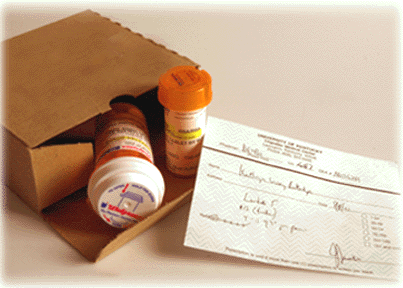 Patients can be provided with a 30-day supply of medications at each fill, increasing the possibility for billing and reimbursement for drug costs (especially if a site is currently dispensing 90 day supplies).
Patients can be provided with a 30-day supply of medications at each fill, increasing the possibility for billing and reimbursement for drug costs (especially if a site is currently dispensing 90 day supplies).
Patients are able to request their medication early (before the next fill is due) using a new feature in RPMS called Suspense.
Example: patient picked up medication today. He/she can request refill right now for their next fill.
Q: How will staff pharmacists’ & pharmacy technicians’ roles change due to CMOP implementation?
Staff pharmacists will still be involved with processing the refill prescriptions and will likely have more time to review the patient’s electronic record and manage medication therapy.
The pharmacy technicians’ workload of filling prescriptions will decrease, allowing more time for monitoring point-of-sale billing and inventory management. One additional duty the technicians have with CMOP is answering the phone and looking up tracking information if the patient didn’t receive their medication.
Stay tuned in a future issue to find out the rest of the answers to FAQs like whether every site will be required to use VA CMOP and what may be in store for tribal facilities. You’ll also see how CMOP would work if integrated with your pharmacy services.
Expecting pharmacy staffing needs in your IHS/tribal pharmacy? Not looking for just a warm body? Get options – select IHS-experienced pharmacists for your pharmacy
The Word “But” – Communicating to Be Heard Corner
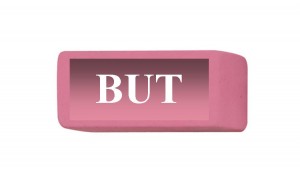
Ever hear a compliment, only to be let down when you hear the word “but”? “You’ve been doing a great job with counseling patients lately, BUT let us move more patients through the pharmacy faster.”
Before you hear anything else after “BUT”, you already anticipate to be let down by something negative. It’s what my friend & Communications Expert Kay White calls “The Great Eraser” in her #1 best-selling book “The A to Z of Being Understood: Make Your Voice Heard and Your Conversations Count”.
What if you could change the tone of what you’re about to say by making a simple switch?
Here are two simple tips I learned from Kay to overcome “The Great Eraser:”
 Tip #1: Changing “but” to “and”. A useful way to avoid the “but” trap is to replace it with ”and.” The word “and” works as a bridge, instead of breaking the sentence up and highlighting the negative.
Tip #1: Changing “but” to “and”. A useful way to avoid the “but” trap is to replace it with ”and.” The word “and” works as a bridge, instead of breaking the sentence up and highlighting the negative.
Example: “You’ve been doing a great job with counseling patients lately, and why don’t we move more patients through the pharmacy faster also.”
Tip #2: Flip It – Say the negative part first, and the positive part last. That way the comment is left on a positive note.
Example: We really need to move more patients through the pharmacy faster, but you’ve been doing a great job with counseling patients lately.
 Doing this will make a difference between being heard and having both points received vs. ending a conversation on a negative note. Start watching for The Great Eraser as you counsel patients, talk to co-workers or your pharmacy manager, or even think to yourself—I’ll bet you catch yourself doing it more often than you think.
Doing this will make a difference between being heard and having both points received vs. ending a conversation on a negative note. Start watching for The Great Eraser as you counsel patients, talk to co-workers or your pharmacy manager, or even think to yourself—I’ll bet you catch yourself doing it more often than you think.
It might take a while to get used to pausing before talking to avoid using the word “but,” BUT it is worth it because it will make a huge difference in your communication skills and help you to really be heard in the work place and in your personal life. Comment below on what you think of these tips, or how it’s going for you trying them out.
5 Steps to Being a Pharmacist Candidate Magnet
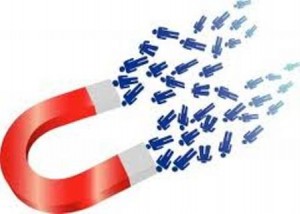 Now that the pharmacy job market is an employer’s market, many of you pharmacy directors (and pharmacy residency program directors) making hiring decisions are flooded with pharmacist resumes to choose from. Now the challenge becomes how to find the right fit in the least time-consuming way, so you can focus on pharmacy operations.
Now that the pharmacy job market is an employer’s market, many of you pharmacy directors (and pharmacy residency program directors) making hiring decisions are flooded with pharmacist resumes to choose from. Now the challenge becomes how to find the right fit in the least time-consuming way, so you can focus on pharmacy operations.
One of the best strategies to saving time in your hiring process is being a candidate magnet. That way you attract the ones that are the right fit, and repel the ones who aren’t. The chances of your new pharmacist hire staying will be higher. Then you won’t have to hire as much.
Let me share with you a few secrets of being a candidate magnet. If you are using these strategies, you will have better luck with identifying the right fit and save yourself headaches of a bad hire.
Here are the first three steps of the 5-step process I teach about being a candidate magnet:
ST EP 1: Clarify what your pharmacy/hospital/organization stands for, what’s important to the role, how the pharmacist would fit into the big picture, and what makes your pharmacy special (Read ideas about figuring this out below).
EP 1: Clarify what your pharmacy/hospital/organization stands for, what’s important to the role, how the pharmacist would fit into the big picture, and what makes your pharmacy special (Read ideas about figuring this out below).
STEP 2: Write an attractive job description and convey what makes you different.
STEP 3: Get the word out (You’ll be learning some of my tips in a future article about this). The first step is one that is glossed over when hiring. Most pharmacy directors who are involved with justifying the position from a financial perspective to get a position approved by administration will spend time on how the pharmacist would fit into the big picture and on the roles and responsibilities. But take time to consider a few important questions (see sample answers below):
1. What are the values and beliefs of my pharmacy?
- Do what it takes – go above & beyond
- Open your heart to others
- Pitch in
- Have fun in your work
- Be creative in decision-making
2. What are the values and beliefs of my hospital/organization?
- Connection and contribution
3. What makes my pharmacy special?
- Every pharmacist has the opportunity to do clinical work
- Everyone is valued for their ideas and has the opportunity to use their talents
4. What is important to this role I’m hiring for? (Include what a typical workday be like, skills they would come with and those that they’d be capable of being trained on, how the pharmacist would interact with other patients and co-workers, and the non-negotiable values) Key Tip: Include the characteristics you want the pharmacist to have. The answers to the first few questions will likely be a part of this answer. Example: Conscientious, strong ethics, heart-centered, going above and beyond, creativity Use the answers to these questions not only in writing your magnetizing job description, but also through your screening process. It is the foundation of attracting the best fit.
Want to learn the rest of the 5 steps, plus learn how to find candidates when you needed them yesterday and weed out the wrong fit quickly?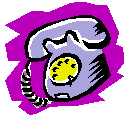
Register for instant access to the FREE teleseminar “Insider Secrets the Best Recruiters Use to Attract the Right Candidates”
You’ll Learn:
- How to Be a Candidate Magnet – learn how to attract the right candidate, not pursue them
- Secrets to finding candidates when you needed them yesterday
- Buyer Beware! Why the perfect resume may not be the perfect candidate
- Simple steps to weed out the wrong ones quickly & effectively
- How to identify “red flag” candidates
- 3 reasons why most job descriptions actually turn off your best candidates, rather than attract them
Enter your name and email above to get instant access to this free teleseminar!
Secrets to Negotiating the Highest Salary
 How do you know if you’ve done what you could to negotiate for the highest salary? A PGY2 oncology resident I’m working with has a dilemma about whether to stay on at the hospital where she’s doing her current residency at a salary that is around $30,000 lower than another offer she has. She would rather stay at the hospital she’s currently at, but the salary difference is so significant that he was bummed. She didn’t think it was possible for them to come back with an offer that he could accept.
How do you know if you’ve done what you could to negotiate for the highest salary? A PGY2 oncology resident I’m working with has a dilemma about whether to stay on at the hospital where she’s doing her current residency at a salary that is around $30,000 lower than another offer she has. She would rather stay at the hospital she’s currently at, but the salary difference is so significant that he was bummed. She didn’t think it was possible for them to come back with an offer that he could accept.
What to do in this scenario?
 Let me peel back the curtains and share with you a few tips I gave her to use as her personal arsenal during negotiations at the hospital she wanted to stay at. These valuable tips are centered on a mindset shift that can inspire a pharmacy hiring manager to give you more money (or an offer package) than you would’ve imagined.
Let me peel back the curtains and share with you a few tips I gave her to use as her personal arsenal during negotiations at the hospital she wanted to stay at. These valuable tips are centered on a mindset shift that can inspire a pharmacy hiring manager to give you more money (or an offer package) than you would’ve imagined.
#1 It’s not all about the money. Approach the conversation with the mindset of partnership. I remember growing up watching my dad negotiate. He had a specific style of negotiating–Hardball. He always started with what someone else offered for the same product or service…”they are doing this for me…so it would make sense for you to do this for me.” I remember thinking that it didn’t “feel good”, even though it seemed to work for him.
That style of negotiating doesn’t work for me, although I mimicked it for years until I discovered it was possible to get the outcome I was looking for while having it feel good.
 Negotiation is not just about getting your way. It’s about putting things on the table to come up with the best possible scenario for both of you. For example, you may want 14 additional vacation days and your employer may be ok with this if you agree to work weekends for half the year. You may not come to discover that this kind of exchange would work for both of you until you put things out on the table & brainstorm on how to make it work .
Negotiation is not just about getting your way. It’s about putting things on the table to come up with the best possible scenario for both of you. For example, you may want 14 additional vacation days and your employer may be ok with this if you agree to work weekends for half the year. You may not come to discover that this kind of exchange would work for both of you until you put things out on the table & brainstorm on how to make it work .
#2 Appeal to the pharmacy hiring manager (HR or pharmacy director)’s perspective and focus on what you can do for them. Help them to see what would it mean for them if they were to hire you over someone else. Will you be saving them time or money by avoiding a hiring decision that doesn’t work out?
For the oncology pharmacy resident I was helping, if she stayed at the same hospital she was doing his residency at, she would be reducing the employer’s risk of hiring a new pharmacist who might not be a fit for the hospital. Plus, since she is already working there, the initial training process would be minimal. Hiring managers know that no matter how diligently they screen during the interview process, they are taking on a risk by hiring someone new.
 The cost of turnover is high. Show that your pharmacist experience demonstrates a proven record of excellence that aligns with the hospital’s culture and team, and hiring managers will love knowing that you won’t be a high risk to them.
The cost of turnover is high. Show that your pharmacist experience demonstrates a proven record of excellence that aligns with the hospital’s culture and team, and hiring managers will love knowing that you won’t be a high risk to them.
The reason why going into negotiations with this simple mindset shift is so effective is because it changes the tone of the conversation from “how can I get what I want” to “how can we make this benefit both of us?” Once negotiations are over, the tone you set during the negotiation process can carry over to your working relationship. This will help you start off in the spirit of partnership.
Try using the simple mindset shift above the next time you negotiate for a higher salary/offer. Comment below on what happened before in your previous negotiations that didn’t work for you, so we can all learn from it.
Are you an experienced hospital pharmacist and want access to unadvertised jobs before they come out? Get access here.
After you’ve internalized this mindset shift, check back here later for tips on what to do or say during negotiations so that you get the best offer. Plus, stay tuned to hear what happened to the PGY2 oncology resident’s negotiation in a future article.
Pharmacist Salary Trends – What Pharmacists Are Getting Paid the Most?

Are pharmacist salaries going down? What kind of pharmacist is getting paid the most in this current pharmacy job market?
Based on comparing pharmacist salary surveys (compiled by Mercer) taken between the spring 2010 and fall 2011 survey edition, pharmacist salaries have increased. Pharmacy managers who manage the day-to-day operations of hospital pharmacies make the most, even compared to retail pharmacy managers.
Hospital staff pharmacists experienced the smallest increase compared to the other pharmacy positions surveyed. Retail pharmacists and hospital retail/outpatient pharmacists seem to have the highest % increase in salary from the previous year, compared to pharmacists in other positions.
A few things to note when interpreting the survey results: salaries are based on 77 organizations participating in the survey and the # of organizations participating in the survey seemed to have decreased from spring 2010’s pharmacist salary survey. The # of organizations participating in the survey who reported hospital staff pharmacist salary surveys decreased in half. Keep in mind that the results were compiled in middle of the year in 2011 for the fall survey publication.
Without doing research on statistical significance and a more detailed analytical comparison from year-to-year, my observations are that the salaries are increasing.
 As far as what I’m observing in pharmacist salary trends right now, salaries appear to stay in a similar trend. My projections are that until we make ourselves more valuable (aka make more money for the pharmacy or demonstrate in a hospital setting for example that we save healthcare costs) to warrant an increase in salary, the salaries will stay similar for now.
As far as what I’m observing in pharmacist salary trends right now, salaries appear to stay in a similar trend. My projections are that until we make ourselves more valuable (aka make more money for the pharmacy or demonstrate in a hospital setting for example that we save healthcare costs) to warrant an increase in salary, the salaries will stay similar for now.
What about temp pharmacist jobs? Look out for the update on that in an article coming soon.
How do the salary trends affect you, even if you have a job? Use the information to get a raise. Make yourself valuable. It goes back to the basics of any business. The more value you provide to the business (aka pharmacy), the greater asset you will be and you may ask for a raise. Not sure what the best way is to ask for a raise, or to ask for the fairest compensation when you are looking for a new job? Stay tuned in an upcoming article on tips to ask for a raise/fair compensation and get it. You will also find out what pharmacist jobs have more negotiating power.
If you qualify for a recruiter to network on your behalf, use your recruiter to help you negotiate a fair compensation for you. Remember, it’s not all about the salary—it’s the whole package.
Comment below (you can keep it anonymous if you wish) about what you’ve seen with salaries at your workplace.
I’ve included the National Results from the 2010 Spring Edition Pharmacist Salary Survey from Mercer Human Resource Consulting. *Keep in mind that there are absolutely variations geographically & you may be compensated differently due to the depth of role that you have.
2011 Pharmacy Compensation Survey – Fall Edition
National Results
| Pos Code(s) |
Pos Title(s) |
# Orgs | # Obs | $ Hourly Base Pay Wgtd Mean | $ Annualized Base Pay Wgtd Mean* |
| 100 | Pharmacy Team Mgr | 63 | 28,953 | 61.89 | 128.7 |
| 200 | Staff Pharmacist – Retail | 18 | 57,374 | 57.08 | 118.7 |
| 205 | Staff Pharmacist – Hospital | 45 | 3,823 | 53.83 | 112.0 |
| 210 | Staff Pharmacist (Healthcare Retail/Satellite) | 12 | 381 | 54.78 | 113.9 |
| 220 | Staff Pharmacist (Mail-order/Online) | 9 | 2,141 | 53.92 | 112.2 |
| 250 | Clinical Pharmacist | 43 | 898 | 55.41 | 115.3 |
| 270 | Nuclear Pharmacist | 5 | 375 | 55.54 | 115.5 |
| 200 205 210 220 250 270 |
Staff Pharmacist – Retail, Staff Pharmacist – Hospital, Staff Pharmacist (Healthcare Retail/Satellite), Staff Pharmacist (Mail-order/Online), Clinical Pharmacist, Nuclear Pharmacist | 77 | 64,992 | 54.84 | 114.1 |
| 300 | Lead Pharmacy Tech | 52 | 25,231 | 18.60 | 38.7 |
| 310 | Pharmacy Tech | 75 | 122,454 | 15.39 | 32.0 |
| 300 310 |
Lead Pharmacy Tech, Pharmacy Tech | 76 | 147,685 | 15.76 | 32.8 |
*Annualized Weighted Mean reported in thousands.
This data provides reasonable estimates of market rates in the Pharmacy industry. However, many factors contribute to the final determination of pay rates, including company philosophy and the influences of each individual incumbent. For that reason, Mercer, Pharmacy OneSource, and PharmacyWeek suggest that you use multiple resources in the development of a total compensation program.
Mail-Order Pharmacy for IHS?
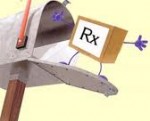 Last year, someone I know who works at the VA told me that as a pilot program, a VA mail-order facility started filling prescriptions for an IHS site around June/July in South Dakota. And that a site in Oklahoma was thinking about coming on board too. The idea, my friend said, was to get IHS on board with the VA filling their prescriptions through mail-order. My first reaction was that of being completely surprised. Then I tucked the thought away to revisit it after hearing more. Now we are beyond Valentine’s Day in 2012 and to my understanding, this idea may be further along than a pilot idea.
Last year, someone I know who works at the VA told me that as a pilot program, a VA mail-order facility started filling prescriptions for an IHS site around June/July in South Dakota. And that a site in Oklahoma was thinking about coming on board too. The idea, my friend said, was to get IHS on board with the VA filling their prescriptions through mail-order. My first reaction was that of being completely surprised. Then I tucked the thought away to revisit it after hearing more. Now we are beyond Valentine’s Day in 2012 and to my understanding, this idea may be further along than a pilot idea.
Mail-order for the IHS—what do you think?
My first reaction was wow–this new implementation feels opposite to what the praised IHS pharmacy model of patient care stands for. If mail-order were implemented, patients may miss out on an important opportunity for a timely medication intervention or to get their medication-related questions answered by a pharmacist.
There have been many times while working at an IHS/tribal pharmacy, I remember sharing something important with a patient that had an impact on their medication adherence & health (translating to healthcare cost savings), which would never have come up if I had not interacted with them in person. It’s like talking to your personal trainer on the phone and getting some basic tips vs. seeing your personal trainer through a full workout. He or she gets to hold you accountable in a more impactful way in person. The level of personalized care jumps exponentially.
Then I wondered what the plus side would be. Perhaps there would be easier access to medication for patients. Workload can be taken off current pharmacists’ plate for more clinical work.
But is it realistic to hope that budgets would allow pharmacists to do more clinical work, or will sites end up having a reason to cut the budgets even more when mail-order is implemented?
 Comment below (and feel free to post anonymously) about what you think the pros & cons are. Share your opinion and be heard. You’ll get updates in an upcoming issue about the status of this concept and its implementation in IHS, what IHS/tribal pharmacy directors throughout the country think about its impact on our patients & practice, and ideas on how best to make it work.
Comment below (and feel free to post anonymously) about what you think the pros & cons are. Share your opinion and be heard. You’ll get updates in an upcoming issue about the status of this concept and its implementation in IHS, what IHS/tribal pharmacy directors throughout the country think about its impact on our patients & practice, and ideas on how best to make it work.
Are you an IHS-experienced pharmacist and interested in temporary IHS jobs? For access to IHS travel assignment options, click here.
The New Year Phenomenon
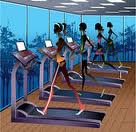 My husband likes to work out at the gym. He went the other day and couldn’t believe how packed it was. The New Year’s Resolution phenomenon in full swing. Ben (my husband) said to me, “Give it another month, and the gym will be back to normal”. I guess he doesn’t have much faith in all the people there excited about their new founded habit to get their butts out the door and to the gym a month from now.
My husband likes to work out at the gym. He went the other day and couldn’t believe how packed it was. The New Year’s Resolution phenomenon in full swing. Ben (my husband) said to me, “Give it another month, and the gym will be back to normal”. I guess he doesn’t have much faith in all the people there excited about their new founded habit to get their butts out the door and to the gym a month from now.
As we start the New Year, many of us take this step into a new year as a symbolic opportunity to step into doing things differently. The key is whether we can sustain that new commitment to ourselves to make a lasting difference on the way we choose to live. This applies to any intention you set for yourself, like getting yourself a new fit body, a new job, or a new habit (like never being late again).
The first step is recognizing what didn’t serve you.
 It might have been bubbling up inside you…a knowing that something didn’t work for you. For example, in the past, when you searched for jobs, did you mostly search online (isn’t that what everyone does these days to find a job)? What about blasting out your resume to many places online and not hear back from the ones you really wanted to hear from? Did you use the same resume for every application?
It might have been bubbling up inside you…a knowing that something didn’t work for you. For example, in the past, when you searched for jobs, did you mostly search online (isn’t that what everyone does these days to find a job)? What about blasting out your resume to many places online and not hear back from the ones you really wanted to hear from? Did you use the same resume for every application?
Maybe it didn’t work that well, or maybe it worked ok, but boy was it a lot of work. You had a feeling that surely there must be a different less time consuming way.
All those people at the gym recognized the first step. But why isn’t it always lasting? How can it be different this year with your resolution?
The second step is deciding what you want to commit to. Commit to it, and then never look back.
Don’t bring any misery of regret, beating yourself up, or memory of your previous habit (or way of doing things) that didn’t serve you before along with you as you create your new habit or new mindset.
When looking for jobs, decide that you will only apply for a few jobs that you are most interested in, and put most of your efforts there. This allows you to take the time to understand the role, get to know the pharmacy or hospital you are most interested in (their vision, leadership, work environment, etc), and highlight yourself in a way that makes them want to chase you. It also gives you an advantage because knowing this in detail will help you make an impression that other “spray & pray” candidates won’t have a chance in making. Be committed to doing things differently with your job search & don’t look back.
 This year, I’m taking my own medicine. In reflecting about what frustrated me about our company in 2011, this is what came to me…
This year, I’m taking my own medicine. In reflecting about what frustrated me about our company in 2011, this is what came to me…
What didn’t serve us: not being able to serve the pharmacists in our community the way we wanted. Many pharmacists contacting us for our help, and not enough people/resources to serve them in an effective way that solved their problems/challenges in a timely manner.
What we decide to commit to & never look back from: Pharmacist Job Connection (which was trying to be too many things to too many pharmacists) is getting a facelift.
Pharmacist Job Connection is going to be about helping pharmacists learn how to stand out in their job search to beat their competition for interviews & offers.
RPh Temp Service (our temp division specializing in Indian Health Service travel assignments) will continue to be the most requested temp agency serving Native American pharmacies (IHS/tribal).
Now here’s the exciting news…
Hospital Pharmacist Job Connection is a fresh face in our family…it will exclusively help experienced hospital pharmacists get introduced directly to hiring decision-makers and access jobs before they’re advertised.
If you are a hospital experienced pharmacist (ie, clinical coordinator, clinical pharmacy specialist, informatics pharmacist, PGY2 residency-trained, or pharmacy director/manager), click here to be kept in the loop about how to cut down on your time consuming job-seeking process.
If you are a hospital pharmacy director/hiring manager tired of sifting through hundreds of resumes & getting backed up with your workload, be the first to hear about 1) secrets on how to hire “The One”, or 2) options to hand off searching, finding, & hiring “The One” to experts.
Hiring Pharmacists: Is Experienced or Inexperienced Better?
Should you hire an inexperienced or experienced pharmacist?

Sounds like an obvious question, doesn’t it?
The answer?
It’s simple but not always obvious.
Some pharmacy hiring managers love to hire inexperienced pharmacists with the right attitude and train them to their pharmacy/company’s ways of doing things & groom them. Others prefer more experienced pharmacists, so management can save time with training. *Note: in this job market, the definition of inexperienced that I’m referring to is a few years of experience or less.
Here are the 3 most common mistakes of hiring based on experience or inexperience. You may identify with one of them and gain a few insights, plus save yourself headaches when you hire:
Mistake #1: Hiring inexperienced people with the right attitude & fit, but not having the time/energy to set them up to meet or exceed your expectations. You tell yo urself you will create a comprehensive training program, but you really don’t have time for this kind of thing. It gets put on the backburner because of all the other things you HAVE to do.
urself you will create a comprehensive training program, but you really don’t have time for this kind of thing. It gets put on the backburner because of all the other things you HAVE to do.
Before you know it, your new hire is either frustrated and not performing to the way you’d like, or you talk yourself into not needing to create a comprehensive training program. You tell yourself that the first few week or two of training should’ve been enough.
Even more frustrating, your new hire decides to leave after a short period of time, even though the pharmacist seemed like he/she wanted to stay a long time with you.

Pharmacist Slacking Off
Mistake #2: Hiring primarily based on experience, and getting excited about someone’s achievements but not being careful with the rest of your screening process (including not following your intuition). You tell yourself that you don’t have to worry as much about assessing their fit, because this person has worked many years at another pharmacy successfully. Surely they’ll catch on even though they start out performing below your expectation. You let your guard down and skip over parts of your typical screening process.
Caution (Hiring Alert!): Working many years at another pharmacy and doing well there doesn’t automatically translate into doing well in your pharmacy’s culture and expectations. Your potential hire’s previous goals aligned with that employers’, but does his/her current goal align with your pharmacy’s?
Mistake #3: Hiring and allowing someone to continue at your organization when you realize they consume too much of your time (not in a beneficial way), or may be toxic to your staff. You think it will be too much trouble to go out there & look for a new hire again. You stay in this bad marriage because you committed, right?* Now, in most cases, I’m all about commitment in a marriage & staying until things get worked out, but having someone on your staff is not completely like a marriage (although there are similarities).
You can have patience & compassion to an extent about your new hire, but if it doesn’t work out, the decision to let him/her go will prevent that person’s ability to affect other staff members’ work. In fact, hanging on to someone who’s not right for your pharmacy can prevent others from performing their best.You can have a different relationship with your hire who didn’t work out, ie: an acquaintance, but you don’t need to have them consume your time & emotional energy as a staff member whom your pharmacy’s paying for.
What is the solution to these potential headaches?
If you hire someone inexperienced, take the time to assess how much time and energy it will take of yours and your staffs’ to get your new hire up to speed. Beyond that, how much time and resources will it take for them to excel? When you hire someone inexperienced, hiring someone with the right attitude and “fit” becomes even more important. If you end up finding out after they start & it doesn’t look like it’s going to work out, you’ve just spent a tremendous amount of your energy getting them on board. Take care in assessing the “fit” and attitude of your inexperienced hire.
If you hire someone experienced, make sure you have someone who has the attitude and “fit” of your pharmacy organization, not just on a short-term basis but a long-term basis.
These common hiring mistakes above can not only happen when hiring a pharmacist for a full-time position, but especially when hiring someone to fulfill a temporary need. Most of the time when you are pressed for a last-minute need, you really don’t have time to ie, train someone with little experience, or deal with headaches of someone who is not the right fit.
This is where having a relationship with a recruiting company that specializes in the area of pharmacists you’re looking for and who knows you well can really give you value that no one else can. There is nothing better to be said for fit, experience, & the right attitude. Sometimes not having the right fit nailed down can really cost you.
When you have a secret weapon who knows you, your pharmacy’s vision, and more about your team so they are sizing up candidates based on much more than experience, the result of finding the right “fit” can save you headaches, time, and beaucoup bucks.
Add that with getting access to the most experienced pharmacists in the area of specialty your pharmacy’s looking to hire, and you have an edge to save yourself a lot of hassle & long-term hiring costs that other pharmacy hiring managers don’t have.
Pharmacists: Give Your Greatest Gift in 2012
 As the year comes to a close, acknowledge yourself for the gift you’ve given your patients and colleagues this year-maybe your clinical intervention saved someone from a serious adverse effect, what you said brightened up someone’s day, or just being you was an inspiration to your co-worker/pharmacy staff even when you didn’t realize it.
As the year comes to a close, acknowledge yourself for the gift you’ve given your patients and colleagues this year-maybe your clinical intervention saved someone from a serious adverse effect, what you said brightened up someone’s day, or just being you was an inspiration to your co-worker/pharmacy staff even when you didn’t realize it.
As we enter into the new year, I challenge you to join me in taking this on for the next 48 days: decide every moment that you’ll give without bothering how the other person is responding or reciprocating (including in your job)…go to your extreme of giving. See yourself explode in intelligence & energy. Be your own source of inspiration to live & expand in every dimension of your life (-inspiration from Paramahamsa Nithyananda).
On the one hand, you can resolve to do just the minimum because you may decide that you don’t like your job or your boss. You may decide to give only how much you feel you are receiving. But you’ll end up stunting your own creativity, and the person who will suffer the most from it is you.
 You have the capacity to be an inspiring leader regardless of what role you play...an inspiration to others while giving your greatest gift. Your gift may not be the same as those around you (so drop all comparison!)…your gift is unique & can only be expressed by you.
You have the capacity to be an inspiring leader regardless of what role you play...an inspiration to others while giving your greatest gift. Your gift may not be the same as those around you (so drop all comparison!)…your gift is unique & can only be expressed by you.
Have a wonderful holiday—may those of you who choose to be inspired share bliss and joy with everyone around you. Email me & share your reflections with me in your 48-day journey. I’ll be thinking of you with love and inspiration as we enter the New Year!